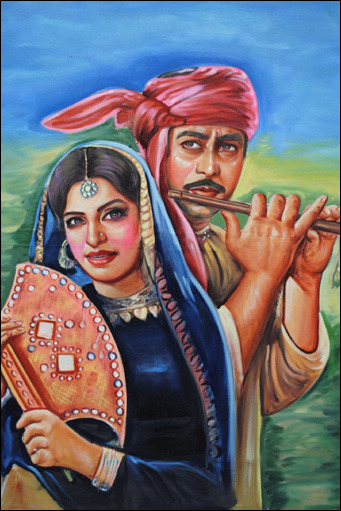Heer Ranjha (ਹੀਰ ਰਾਂਝਾ)

Heer Ranjha is one of the four popular tragic romances of the Punjab. The other three are Mirza Sahiba, Sassi Punnun and Sohni Mahiwal. There are several poetic narrations of the story, the most famous being ‘Heer’ by Waris Shah written in 1766. It tells the story of the love of Heer and her lover Ranjha. Well-known poetic narrations have also been written by Damodar Das Arora, Mukbaz and Ahmed Gujjar, among others.
“Awal-akhir naam Allah da lena, duja dos Muhammad Miran
Tija naun mat pita da lena, unha da chunga dudh sariran
Chautha naun an pani da lena, jis khave man banhe dhiran
Panjman naun Dharti Mata da lena, jis par kadam takiman
Chhewan naun Khwaja Pir da lena, jhul pilave thande niran
Satwan naun Guru Gorakhnath de lena, patal puje bhojan
Athwan naun lalanwale da lena, bande bande de tabaq janjiran”
Heer is an extremely beautiful woman, born into a wealthy Jat family of the Sayyal clan in Jhang, Punjab. Ranjha (whose first name is Dheedo; Ranjha is the surname), also a Jat of the Ranjha clan, is the youngest of four brothers and lives in the village 'Takht Hazara’ by the river Chenab. Being his father’s favorite son, unlike his brothers who had to toil in the lands, he led a life of ease playing the flute ('Wanjhli’/'Bansuri’). After a quarrel with his brothers over land, Ranjha leaves home. In Waris Shah’s version of the epic, it is said that Ranjha left his home because his brothers’ wives refused to give him food. Eventually he arrives in Heer’s village and falls in love with her. Heer offers Ranjha a job as caretaker of her father’s cattle. She becomes mesmerised by the way Ranjha plays his flute and eventually falls in love with him. They meet each other secretly for many years until they are caught by Heer’s jealous uncle, Kaido, and her parents Chuchak and Malki. Heer is forced by her family and the local priest or 'mullah’ to marry another man called Saida Khera.
Ranjha is heartbroken. He wanders the countryside alone, until eventually he meets a 'jogi’ (ascetic). After meeting Baba Gorakhnath, the founder of the “Kanphata”(pierced ear) sect of jogis, at 'Tilla Jogian’ (the 'Hill of Ascetics’, located 50 miles north of the historic town of Bhera, Sargodha District, Punjab), Ranjha becomes a jogi himself, piercing his ears and renouncing the material world. Reciting the name of the Lord, “Alakh Niranjan”, he wanders all over the Punjab, eventually finding the village where Heer now lives.
The two return to Heer’s village, where Heer’s parents agree to their marriage. However, on the wedding day, Heer’s jealous uncle Kaido poisons her food so that the wedding will not take place. Hearing this news, Ranjha rushes to aid Heer, but he is too late, as she has already eaten the poison and died. Brokenhearted once again, Ranjha takes the poisoned Laddu (sweet) which Heer has eaten and dies by her side.
Heer and Ranjha are buried in Heer’s hometown, Jhang. Lovers and others often pay visits to their mausoleum.
It is believed that the poem of Heer and Ranjha had a happy ending but Waris Shah gave it the sad ending described above, thereby giving it the legendary status it now enjoys. It is argued by Waris Shah in the beginning of his version that the story of Heer and Ranjha has a deeper connotation - the relentless quest of man (humans) for God.
quark4561 liked this
 manneevamatuchi reblogged this from ehmerapunjab
manneevamatuchi reblogged this from ehmerapunjab  alljunknopoetry liked this
alljunknopoetry liked this  mermaidsneedwater liked this
mermaidsneedwater liked this  jit000 liked this
jit000 liked this  soniig liked this
soniig liked this signamri liked this
thesoundofmusicandlove liked this
kamalpreet48 liked this
rangdeenis reblogged this from ehmerapunjab
my-ordered-disorder liked this
my-ordered-disorder reblogged this from ehmerapunjab
thingsravlikes liked this
ehmerapunjab posted this
